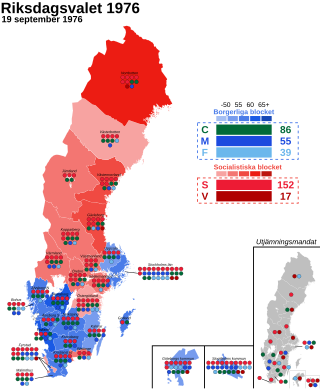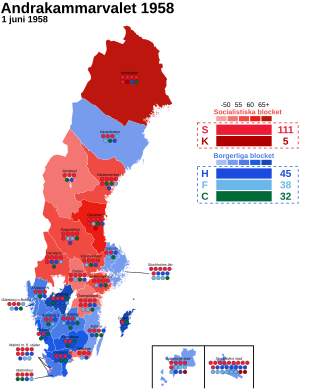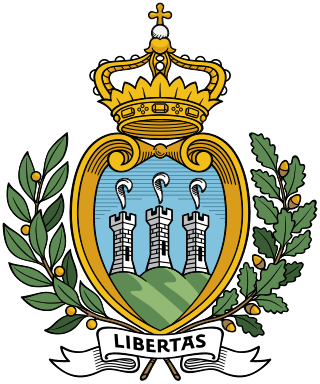
Since the introduction of parliamentarism in Sweden, six national referendums have been held. Legal provisions for referendums were introduced in 1922, one year after the adoption of universal suffrage. The Constitution of Sweden provides for binding referendums, but all referendums held as of 2012 have been non-binding. The latest referendum, on adopting the euro, was held on 14 September 2003.
Guaranteed minimum income (GMI), also called minimum income, is a social-welfare system that guarantees all citizens or families an income sufficient to live on, provided that certain eligibility conditions are met, typically: citizenship and that the person in question does not already receive a minimum level of income to live on.

General elections were held in Sweden on 20 September 1998. The Swedish Social Democratic Party remained the largest party in the Riksdag, winning 131 of the 349 seats.

General elections were held in Sweden on 16 September 1956. The Swedish Social Democratic Party remained the largest party, winning 106 of the 231 seats in the Andra kammaren of the Riksdag. A Social Democratic-Farmers' League coalition government was formed by Prime Minister Tage Erlander after the election with 125 of the total of 231 seats. Although the non-socialist parties held a majority in the Second Chamber, the Social Democrats held a majority in the First Chamber, so a non-socialist government could not be formed.

General elections were held in Sweden on 19 September 1976. Although the Swedish Social Democratic Party remained the largest party, winning 152 of the 349 seats in the Riksdag, a coalition government was formed with the Centre Party, the People's Party and the conservative Moderate Party, which formed Sweden's first non-socialist government since 1936. Centre Party leader Thorbjörn Fälldin, who had widely been expected to take over the government in the previous election of 1973, was appointed prime minister, the first not from the Swedish Social Democratic Party since Axel Pehrsson-Bramstorp's brief interregnum 40 years earlier.

General elections were held in Sweden on 16 September 1979. Although the Swedish Social Democratic Party remained the largest party, winning 154 of the 349 seats in the Riksdag, the liberal interim government of Ola Ullsten was succeeded by another centre-right coalition government composed of the People's Party, the Moderate Party and the Centre Party, led by Centre Party leader Thorbjörn Fälldin. The three parties together won 175 seats, compared to the 174 won by the Social Democrats and Communists. It was the only time that non-socialist parties retained power in an election between 1928 and 2010. The Moderates dramatically increased their representation in the Riksdag, becoming the largest party of the non-socialist bloc, a position they maintained until 2022.

General elections were held in Sweden on 15 September 1985. The Swedish Social Democratic Party remained the largest party in the Riksdag, winning 159 of the 349 seats. Its leader, Olof Palme, kept his position as prime minister. He would retain this position successfully until his assassination in 1986.

Early general elections were held in Sweden on 1 June 1958, after the defeat of the Social Democratic government's proposals for a new pensions system in a parliamentary vote. The Social Democrats remained the largest party, winning 111 of the 231 seats in the Andra kammaren of the Riksdag, and Tage Erlander's third government was returned to power. In accordance with the law, the new Chamber was elected only to complete the previous Chamber's term, which was due to end in 1960.
Superannuation in Australia, or "super", is a savings system for workplace pensions in retirement. It involves money earned by an employee being placed into an investment fund to be made legally available to members upon retirement. Employers make compulsory payments to these funds at a proportion of their employee's wages. From July 2024, the mandatory minimum "guarantee" contribution is 11.5%, rising to 12% from 2025. The superannuation guarantee was introduced by the Hawke government to promote self-funded retirement savings, reducing reliance on a publicly funded pension system. Legislation to support the introduction of the superannuation guarantee was passed by the Keating Government in 1992.

A referendum on revoking some medical and tuition fees was held in Hungary on 9 March 2008. The proposals would cancel government reforms which introduced doctor visit fees paid per visitation and medical fees paid per number of days spent in hospital as well as tuition fees in higher education. All three were supported by a majority of voters. Prime Minister Ferenc Gyurcsány stated that the fees would be abolished on 1 April 2008 following the referendum, but that the government had no funds available to replace the income lost for the higher educations institutions and health institutions due to the abolishment of the fees.
Tilläggspension is a government-run pension system in Sweden, paid to wage labourers on retirement. It was originally enacted on 1 January 1960 by an act of parliament, and funded by payroll taxes paid by the employers. The original system was called Allmän tilläggspension. The systems are called "supplementary" because they are paid in addition to the general age pension, and the size of the payment is dependent on wages earned and the number of years as a wage earner.
Pensions in Norway fall into three major divisions; State Pensions, Occupational Pensions and Individual or personal Pensions.
According to the International Labour Organization, social security is a human right that aims at reducing and preventing poverty and vulnerability throughout the life cycle of individuals. Social security includes different kinds of benefits A social pension is a stream of payments from the state to an individual that starts when someone retires and continues to be paid until death. This type of pension represents the non-contributory part of the pension system, the other being the contributory pension, as per the most common form of composition of these systems in most developed countries.

A non-binding referendum on nuclear power was held in Sweden on 23 March 1980. Three proposals were put to voters. The second option, the gradual phasing out of nuclear power, won a narrow plurality of the vote, receiving 39.1% of the ballots cast to 38.7% for option 3. Option 1 was the least popular, receiving only 18.9% of the votes.

Full general elections were held in Belgium on 14 October 1894, with run-off elections held on 21 October 1894.
A referendum on restoring voluntary religious education to state schools was held in Estonia between 17 and 19 February 1923. It was approved by 71.9% of voters with a turnout of 66.2%.

Two-stage presidential elections were held in Finland in 1931. On 15 and 16 January the public elected presidential electors to an electoral college. They in turn elected the President.The result was a victory for Pehr Evind Svinhufvud, who won on the third ballot by just two votes. The turnout for the popular vote was 47.3%.
Two-stage presidential elections were held in Finland in 1937. The first stage was on 15 and 16 January 1937 as the public selected 300 presidential electors to an electoral college.
A referendum on the electoral system was held in Slovenia on 8 December 1996. Voters were given three options to approve or not; a compensatory system, a two-round majority system and a proportional representation system at a national level.

General elections were held in San Marino on 12 December 1926 to elect the eighth term of the Grand and General Council. It was a sham election, all opposition being prevented to participate by internal and Italian threats. After it had taken over the country in April 1923, the Sammarinese Fascist Party was the only party to contest the elections, winning all 60 seats, while the official report spoke of a sole dissident ballot. A new electoral law guaranteed safe undisputed seats to the two incumbent Captains Regents.












